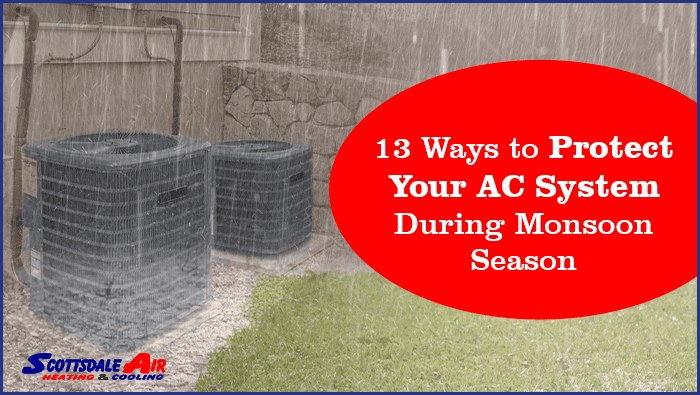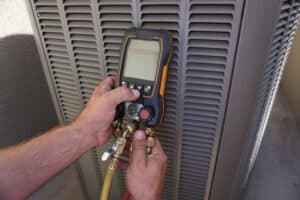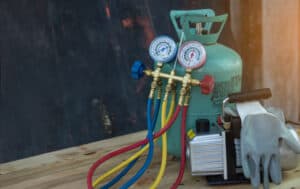Nearly 100 million homes in America are fitted with air conditioning units.
These keep the air in our homes cool, fresh, and clean. However, to get the most out of your AC you also need to take proper care of it.
During monsoon season, your AC system can sustain major damage.
This may mean that you have to fork out for expensive repairs or replace it altogether. Fortunately, there are plenty of things you can do to help protect your system from expensive monsoon damage.
To make sure that your AC system survives the monsoon season, you need to know how you can help. In that case, you’ve come to the right place!
Read on to find out why monsoons can be so dangerous for AC systems and thirteen great ways to protect yours.
What is a Monsoon Season?
While you may be familiar with the term ‘monsoon’ you may not fully comprehend what one of these storms entails.
For example, what is the difference between a hurricane and a monsoon? Or what is a wet monsoon and what is a dry monsoon?
Understanding these differences will help you to understand why they’re bad news for AC systems.
Monsoon season in Arizona lasts from June through to September and is a period of extreme weather. This season is characterized by:
- Rainfall of up to 8.31 inches
- Flash flooding
- Dry storms featuring mile-high walls of dust
- Lightning strikes
Strong winds also feature heavily in monsoon season and contribute to dry storms.
However, unlike hurricanes, these winds usually travel in one single direction rather than moving around a fixed point.
Unfortunately, these extreme storms can cause serious damage to your home’s AC unit because they throw up a lot of debris.
On the plus side, there are plenty of things you can do to protect HVAC your unit. Let’s take a look at them.
1. Carry Out Maintenance Before the Season Hits
For your AC unit to work properly, you need to keep up with its maintenance all year round.
This means that you should regularly check your external unit and keep an eye out for signs of any problems.
That said, it is a good idea to check on your unit shortly before the monsoon season hits.
That way you can get any issues stored before the storms arrive.
2. Clear the Area Around Your AC Unit
During monsoon season, the strong winds blow debris around your garden and into your AC unit.
This is why a big problem for units during monsoon season is that they get clogged with plantlife and other debris.
You can reduce the risk of this happening to your unit by clearing the area around it before monsoon season hits.
Trimming back any branches or bushes near your AC unit means that there will be less debris to come flying off them when the wind picks up.
3. Tidy Up After Gardening
If you do carry out any garden work during monsoon season, it’s important that you don’t leave your clippings lying around.
From loose bougainvillea trimmings, to grass cuttings and raked up leaves — this type of yard debris are perfect fodder for blocking your AC unit vents.
Even if you haven’t been gardening near to the unit, you should make sure that your outdoor space is clear.
In monsoon-strength winds, any debris lying around can travel a long way.
4. Raise Your AC Unit
The wind isn’t your only enemy during monsoon season.
Heavy rain can also be a nightmare for your AC unit, especially if it’s positioned low down on your home.
As the rainwater rises, the last thing you want is your AC unit flooding.
Fortunately, you can protect your unit by raising it higher on the side of your home.
This isn’t a small job so you’ll need the help of a professional.
However, taking the time to get this work done could save your entire system when the rain hits.
5. Clean the Air Filter
One of the most important pieces of maintenance that you should do before monsoon season is putting a clean air filter into your AC system.
This is because the air coming into your home during the season will be full of dust and other particles.
If you have a disposable filter in your AC system then you should change this regularly.
People with severe allergies should change their filters every 30 days.
Those with pets shouldn’t keep the same filter in for more than 60 days. Other households can use a disposable filter for up to 90 days.
Ideally, you should replace your filter with a pleated filter in the monsoon season.
The pleats in these filters increase the surface area of the filter itself. This makes them more effective when it comes to catching debris.
If your system uses a permanent filter then you should clean this thoroughly at the beginning of monsoon season.
You should continue cleaning this regularly as per your system’s instructions.
6. Install a Surge Protector
During monsoon storms, lightning strikes are common occurrences and can lead to a seriously strong electrical surge in your home’s power.
These surges often end up tripping the circuit breaker in your home and this can knock out the power to your AC unit.
When this happens, you will need help from a professional to get your unit up and running and there is nothing to stop this from happening more than once.
Luckily, you can protect your AC unit from these surges by installing a surge protector in your system.
This protects the circuit breaker and stops it from tripping if lightning does strike.
7. Prepare for Flooding
As we’ve already mentioned, flooding can be a serious problem for your AC unit during the monsoon season. Because of this, you should have an action plan in place should flooding occur.
This should include turning off power to the unit immediately to stop it from becoming an electrical hazard.
8. Install Condensate Overflow Shut Off Switch
Your air conditioning system works hard to cool your home, and it helps to remove moisture from your home.
You may notice in July, August, and September your AC is constantly draining water. This is a good thing!
Problems arise with the condensate drain line when it becomes clogged.
If and when it becomes clogged, and the humidity spikes because of monsoon season, you could be dealing with a major water issue.
As the monsoons bring dirt and debris that will get into the condensate drain line it can easily create a clog.
This clog can be a major headache, causing water to leak back into your home. This will often result in water damage and can at times will shut your system down.
To avoid the chance of this happening in your home, you’ll want to install a condensate overflow cut off switch.
You can call to have one installed, or plan to have one installed during your next maintenance visit (depending on how close the monsoon season is).
9. Put Your Own Safety First
Heavy rain and strong wind can be a dangerous combination.
On top of this, getting emergency assistance during a strong may take longer than normal.
That’s why it’s important to look after yourself when attending to your AC unit.
If you aren’t sure how to safely secure it or think going outside might be dangerous, then just turn off the system and wait it out.
The cost of repairing a storm-damaged unit is nothing in comparison to your personal safety.
10. Keep a List of Emergency Contacts
Before a storm hits, it’s a good idea to put together a list of emergency contacts that you may need.
If you do this, then make sure you add the number of your to-to, trusted Scottsdale AC company.
That way, you’ll be able to get help with your unit as soon as possible once the storm has passed.
11. Check on the Unit Regularly
Keeping an eye on your unit during monsoon season can stop a small problem from becoming a big one.
So, when you can, make sure you do this.
Checking for obvious debris is a quick and easy job but it’s also important to take a closer look.
If you suffer from severe allergies or respiratory conditions, you may also want to check the air filters more frequently than normal or even consider having a more robust air filtration system installed at your home.
Remember, air filters have to work overtime during monsoon season so you may have to replace them more frequently as well.
12. Get Help From a Professional
If you have any doubts about your AC system, it is always a good idea to get help from a professional to properly protect your AC system before or during monsoon season.
They will be able to quickly figure out the source of your problem.
They’ll also fix it and do this without causing damage to the rest of your system.
13. Get Your Unit Checked After the Storm Passes
Even if nothing appears to go wrong with your unit during the monsoon season, it is always a good idea to get it checked after a major storm passes.
A professional will be able to do a thorough assessment of the filters and carry out any necessary repairs.
This ensures that you can safely use it without having to worry about potential storm damage.
Getting any repairs done before you use the unit (if you are suspecting an issue) will also stop small issues from developing into bigger problems.
So you could save a lot of money further down the line.
Get Your AC Ready for Monsoon Season Today!
As you can see, Arizona’s monsoon season doesn’t have to end in disaster for your home’s AC system.
Keep these tips in mind and you can’t go wrong.
For more help preparing your AC system for monsoon season here in the Valley of the Sun, contact the experts at Scottsdale Air Heating & Cooling to speak to an HVAC expert today! We’re here to help.
If you have questions about your AC unit and preparing for monsoon season, call Scottsdale Air Heating & Cooling. We’ve been helping families since 1947! We will help your family stay SAFE during the monsoon season! Call 480-467-3586 today or request service online to get started.








